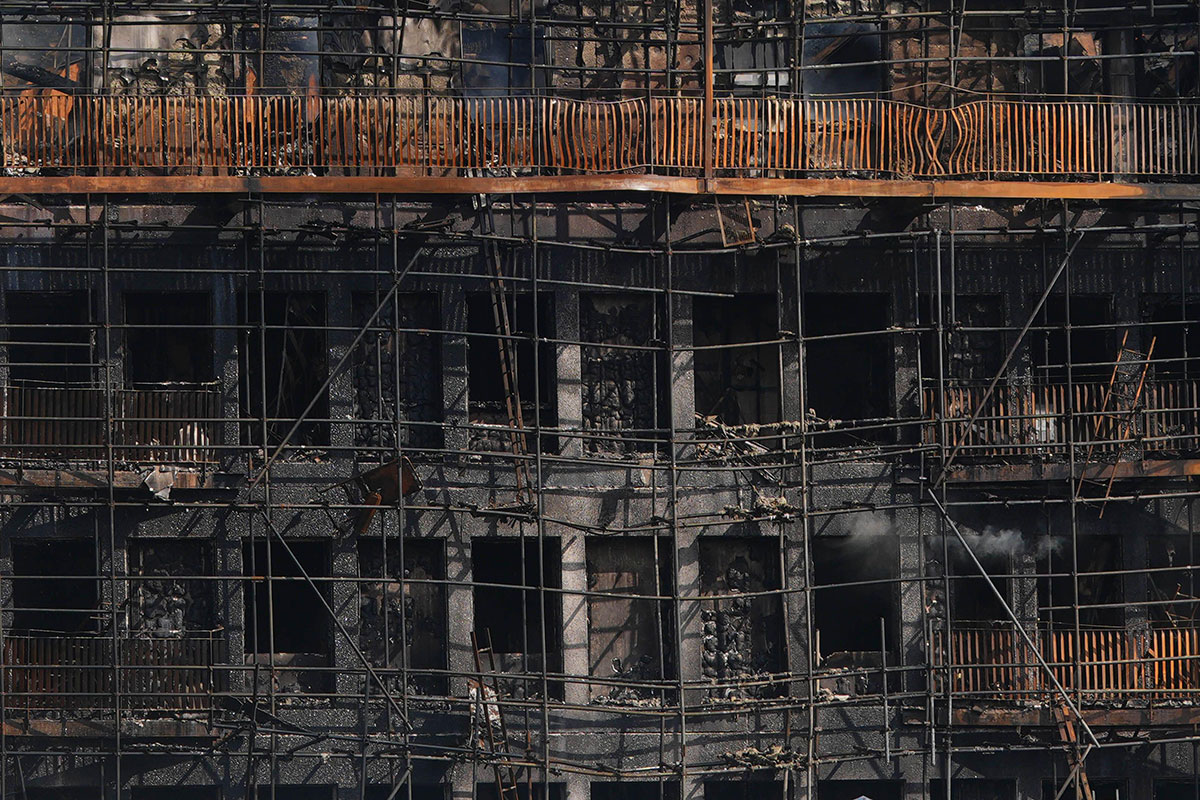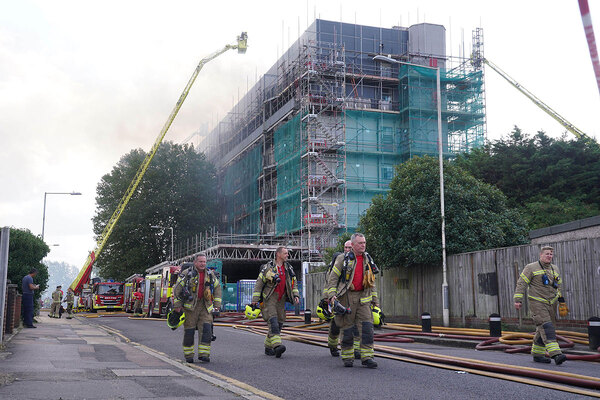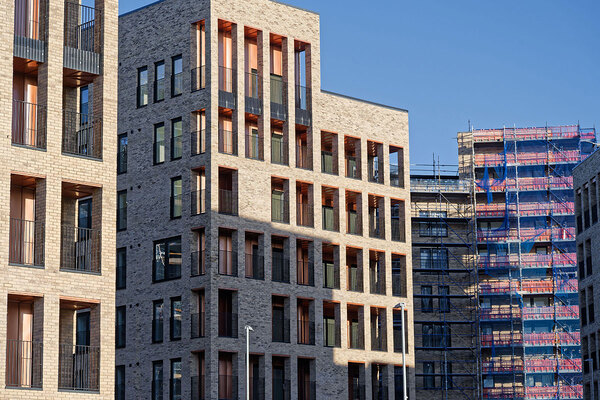The Week in Housing: a fire in east London, and government calls for faster remediation
The Week in Housing is our weekly newsletter, rounding up the most important headlines for housing professionals. Sign up below to get it direct to your inbox every Friday
This week started with some horrifying news: a fire at a block of flats in Dagenham, east London, which spread quickly through the building. Thankfully, no one was hurt, but the incident has sparked fresh debate about the slow progress of cladding remediation in the UK.
Just a week before the second Grenfell Tower Inquiry report was due to be published, the fire engulfed Spectrum House on Freshwater Road in the early hours of Monday 26 August. We know that the block had several fire safety issues and cladding remediation work was under way when the fire broke out.
We also know that residents had raised concerns about those fire safety issues.
This week we ran a story on everything we know so far about the situation.
Just days before the fire, the latest government figures showed that remediation work had not yet started on half of buildings with unsafe cladding.
On Wednesday, housing secretary Angela Rayner called for unsafe buildings to be fixed more quickly in the wake of the fire in Dagenham.
Speaking at a roundtable with building safety minister Rushanara Ali, the Building Safety Regulator and others in the sector, Ms Rayner said the government expected “more from regulators and partners to make sure action is being taken now to make homes safe”.
The Building Safety Regulator put out a statement on Thursday confirming it was working with partners and looking into what happened.
Ms Rayner also announced a ‘New Homes Accelerator’ this week, a new expert group that the government hopes will unlock thousands of homes blocked in the planning system.
It will involve 15 civil servants from the Ministry of Housing, Communities and Local Government and Homes England, working across government and with councils to speed up the delivery of delayed schemes.
New homes cannot come quickly enough, given the government figures that were published this week. Council spending on emergency temporary accommodation has reached £2.29bn, a 29% jump in a year.
Following the data release, homelessness charity Crisis called on the government to provide more financial support to councils in the Autumn Budget.
Crisis also called on the Scottish government to act after its new report warned that missed opportunities to stop people becoming homeless is leading to a “massive” cost for individuals and councils.
Another area of concern for the delivery of affordable homes is that fewer social landlords are planning to buy up Section 106 properties.
Inside Housing’s exclusive data revealed how much affordable housing is delivered this way – and how much is in the pipeline.
We also revealed that Eastlight Community Homes has stopped using the word ‘vulnerable’ to describe individuals or groups in its documentation, deeming the term a “meaningless” adjective.
Instead, Eastlight will use terminology to describe “specific disabilities and circumstances to better understand the challenges individuals may face”, rather than “language that could be detrimental to them”.
It hopes this will help the organisation better identify what work is required to meet residents’ needs and how their services can be adapted and improved.
A new set of regulatory judgements on the consumer standards were released this week.
Alongside the consumer grades, all C1 or C2, the Regulator of Social Housing (RSH) upgraded landlord Southern Housing to the top grade for governance after it improved “risk management” and addressed governance “weaknesses”.
A Housing Ombudsman-ordered review of Peabody found that 180 families were moved from their homes for lengthy periods due to repairs.
Large landlord L&Q announced that it had joined the Manchester Housing Providers’ Partnership as it seeks “new, innovative ways to continue building the homes this country so desperately needs”.
It said it joined the group to put partnership working “at the heart of its ambition to deliver further housing growth in the city”, as well as “play its part in delivering Manchester’s housing strategy”.
The association’s move into the city comes after its acquisition of Trafford Housing Trust.
Several landlords published their accounts this week.
Bucking the trend, Home Group’s annual completions increased by nearly a fifth.
The Newcastle-based landlord handed over 1,284 homes across England and Scotland in the year to the end of March 2024, compared with 1,098 the year before.
However at the same time, the 56,000-home group spent £187m on delivering homes in its most recent full year, which was £7.4m more than in the previous 12 months.
Helen Meehan, chief financial officer at Home Group, said the business environment had remained “challenging” in the year.
Abri spent £100m on improving its existing homes in its last financial year, after taking on another smaller landlord as a subsidiary.
In its latest results, the 50,000-home group reported an 18% increase in the year to the end of March 2024, which was predominantly down to its acquisition of Silva Homes last October.
Platform increased its investment in existing homes by 148% in the first quarter of this year, as the landlord continues to invest in the quality and energy efficiency of its homes.
The planned increase impacted the housing association’s EBITDA MRI interest cover, it said, which fell by 49 percentage points to 168% compared to the first quarter of 2023.
Hyde reported a drop in its surplus of more than three-quarters year on year in its results for 2023-24, and a fall in starts of 61%.
Contractor insolvencies on two developments contributed to the decrease, as well as the reappraisal of two developments and the change of intended use of one scheme, Hyde said.
Large housing association Vivid secured a £100m sustainability-linked facility with HSBC to help build energy-efficient homes.
The five-year revolving credit facility includes targets for delivering sustainable homes and maintaining “high standards of governance”, it said.
The Chartered Institute of Housing Northern Ireland launched a new and comprehensive report this week aimed at tackling the housing and homelessness crisis.
The report, An agenda for change: Tackling the housing and homelessness crisis, outlines a series of strategic policy priorities aimed at addressing the challenges facing Northern Ireland.
This includes a need to accelerate Northern Ireland’s progress towards net-zero housing, secure sustainable capital financing for housing development, and address infrastructure challenges that “threaten future housing growth”.
Something that highlights the point of the report is the news that social housing completions in Northern Ireland more than halved in the latest quarter compared with the same period in 2023-24.
New government figures revealed that 97 social homes were handed over in the three months to the end of June 2024 as part of the Northern Ireland Housing Executive’s Social Housing Development Programme.
This compared with 207 completions in the same quarter last year.
In Wales, housing sector bodies published revised Housing First principles.
The most prominent change is a switch in focus from rough sleeping to providing the service to “people who need it the most”.
This includes people who have experienced repeat homelessness and have experience of trauma, mental health issues or engagement with the criminal justice system, Cymorth Cymru and the Housing First Wales Network said.
A contractor was appointed for a 200-home council housing scheme in West Scotland. Ashleigh Construction signed a £50m agreement with North Ayrshire Council to develop the former maternity ward of Ayrshire Central Hospital.
Elsewhere, it emerged that nearly 100 families have been told they will have to leave their homes after Reading Council confirmed it will close down its wholly owned housing company.
Finally, Inside Housing looked at how the government can overcome barriers to mass heat pump adoption, and why progress has been so slow in the UK compared to other countries in Europe.
Have a good weekend.
Grainne Cuffe, deputy news editor, Inside Housing
Say hello: grainne.cuffe@oceanmedia.co.uk
Editor’s picks
What is really happening with Section 106?
Dagenham fire: what happened and what we know about the building
What is driving the growth of EPC A homes and what does the future hold?
How the Housing Diversity Network believes the sector can prepare for race riots
Sign up for our Week in Housing newsletter
Already have an account? Click here to manage your newsletters












